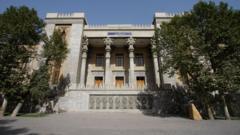Ayatollah Ali Khamenei has voiced skepticism about the potential of US-Iran nuclear talks, particularly regarding the US's demands for cuts to Iran's uranium enrichment program. As tensions simmer and negotiations continue, both sides remain at odds, reflecting a complex web of political and military implications.
Khamenei Skeptical on US Nuclear Negotiations Following Demands

Khamenei Skeptical on US Nuclear Negotiations Following Demands
Iran's Supreme Leader expresses doubts on reaching a new nuclear agreement with the US, criticizing its demands on uranium enrichment.
Iran's Supreme Leader, Ayatollah Ali Khamenei, has raised significant doubts about the ongoing nuclear negotiations with the United States, asserting that he believes the discussions will not culminate in an effective agreement. Khamenei described America’s demands regarding uranium enrichment as "excessive and outrageous." During remarks at a ceremony commemorating late President Ebrahim Raisi, who died in a helicopter crash last year, Khamenei stated, "We don't think it will lead to any outcome. We don't know what will happen."
US President Donald Trump had previously suggested that Iran was "sort of" on board with the terms of a new deal, following several mediation rounds led by Oman. However, sensitive discussions are complicated by Iran's insistence that it will not cease uranium enrichment, a process that can fuel both nuclear reactors and weapons. Amid speculation of potential military repercussions from the US and Israeli forces should the negotiations falter, Iran firmly asserts that its nuclear ambitions are purely peaceful.
Khamenei praised Raisi for rejecting direct negotiations with the US, asserting that Raisi did not allow foreign threats to coerce Iran into capitulating to the negotiating table. He reminded attendees that prior discussions during Raisi’s predecessor, Hassan Rouhani, yielded no fruitful outcomes, suggesting there would be no significant shifts under the new reformist leadership of Masoud Pezeshkian.
Critically, Khamenei chastised the Trump administration, characterizing their communication style as riddled with "nonsensical remarks." He specifically rebuffed US claims that they would not permit Iran to enrich uranium, stating, "No one waits for their permission."
In the ongoing diplomatic back-and-forth, US special envoy Steve Witkoff emphasized that a core condition of any deal must include a comprehensive halt to Iran’s enrichment capacity, which he linked directly to the potential for weaponization. Reacting fiercely to Witkoff's statements, Iranian Foreign Minister Abbas Araqchi labeled such expectations as unrealistic and warned that stopping enrichment was not negotiable.
The backdrop of these discussions is a fraught historical context, stemming from the 2015 nuclear agreement struck under President Obama, which required Iran to limit its nuclear activities in exchange for relief from economic sanctions. Recent reports from the International Atomic Energy Agency have indicated that Iran has amassed substantial reserves of uranium enriched to levels nearing weapons-grade purity.
As the next round of negotiations approaches, both sides continue to navigate a complex landscape of expectations and security concerns, with critical implications for international diplomacy and regional stability.




















